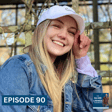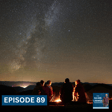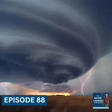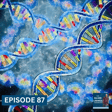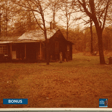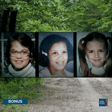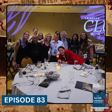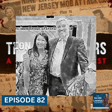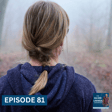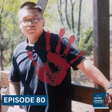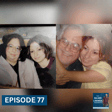00:00:00
00:00:01

Invisible: The Faceless Native Women Who Go Missing with Darlene Gomez
Today, we discuss the heartbreaking stories of Missing and Murdered Indigenous People with Darlene Gomez, a New Mexico attorney who advocates for them and their loved ones and whose own friend, Melissa Montoya, disappeared at a bar on St. Patrick's Day in 2011 in Dulce, New Mexico. Darlene walks us from Melissa's case, the search for justice for her and others and the broader challenges with law enforcement, jurisdictional issues and mistrust when it comes to criminal justice in Native communities.
Visit our website and follow along with us on Instagram, join our Silver Linings Fireside Chat Facebook group and join us on Patreon.
Transcript
00:00:00
Speaker
So throughout this whole time, she has been a silhouette in NamUs. And she wasn't entered into NamUs until quite a long time after she went missing. And so even in the past five years, I've contacted them. I've uploaded a picture. And it's never been it's never been put with her face. um I was able to reach out to the FBI in New Mexico because they do have a monthly list with all of the Native Americans. and Navajo Nation, tribal members that are missing, and so they did upload her picture. But until I went to CrimeCon and started you know talking in the media about my story, they entered her picture about three weeks ago, and finally after 23 years.
00:00:52
Speaker
There was nothing even until very, very recently. The last, the current stories you're seeing are from the past, you know, um maybe since May. And I've been representing her family for 23 years. There was zero coverage. That's Darlene Gomez, an attorney who specializes in tribal law and who lives in Northern New Mexico. This is the Silver Linings Handbook Podcast. I'm Jason Blay.
00:01:34
Speaker
Darlene Gomez has been practicing law for more than two decades and specializes in Indian law and complex family law, and has been a tireless advocate on behalf of missing and murdered indigenous people and their relatives. A lifelong native of New Mexico, more than 23 years ago, Darlene's friend and relative, Melissa Montoya, disappeared and duced New Mexico on the Hickory Apache reservation. Darlene remembers Melissa as a quiet woman with a big smile who she always thought was beautiful. Now Darlene calls Melissa just another quote faceless silhouette who was quote loved by so many people who did not get closure. Days before Melissa disappeared, she warned family and friends that something bad might happen to her.
00:02:29
Speaker
Darlene says that Melissa was in fear and had been the victim of domestic violence, including years of being in a violent relationship with somebody who is not a member of her tribe. Many agencies investigated Melissa's death. They included tribal, local police, local sheriffs, deputies, federal law enforcement, and state police in New Mexico and Colorado. But no one was able to figure out enough to bring charges. The best break in more than a decade came earlier this year when a woman reached out to Darlene saying that while she was looking for a missing relative who disappeared in California, she found what appeared to be remains in the area where Melissa was last seen. Through the woman's research, she thought it might be Melissa and authorities later determined the remains belonged to a native woman somewhere between her 30s and her 60s.
00:03:27
Speaker
Hopes were dashed, however, earlier this year when further testing revealed that it was likely a man. Darlene's search for answers in Melissa's case has led her to this work of advocacy and representation of relatives of missing and murdered natives and their families. People in Native communities go missing and experience violence at disproportionate rates. A 2016 study by the National Institute of Justice found that more than four in five Native women had experienced violence in their lifetimes, including 56% who've experienced sexual violence. In one year, as opposed to their lifetime, according to the report, 40% of Native women had experienced violence then.
00:04:16
Speaker
Darlene helps families navigate the complex web of tribal, local, state, and federal officials in helping bring justice for individuals and families. But she also advocates on the state and national level to bring about change. Darlene is the attorney for the family of Jamie Yazzie, a 24-year-old Navajo Nation woman last seen in Arizona within the boundaries of the reservation. She was last seen in July, 2019, and her body was found with a gunshot wound to the back of her head across the border in the Hopi Indian Reservation in 2021. Her 30-year-old boyfriend, Trey James, was convicted of her murder in 2023.
00:05:01
Speaker
In the Navajo Nation, the rate of homicide is four times the national average, and that doesn't account for the long weathered bodies, where the cause of death cannot be determined, or the people who can never be found. There are only 205 patrol officers and 27 criminal investigators for a population of 174,000 people. The homicide clearance rate is far below the national average. Basically, they've made homicide legal in parts of Indian country. Today, we're gonna discuss the challenges for native communities when it comes to criminal justice, the difficulties for relatives of missing and murdered indigenous people, the complications of these cases, individual stories from Darlene's career, and a better path toward justice.
00:06:06
Speaker
Hey, Darlene, I just wanted to thank you. I really appreciate you coming on to talk about what I think are really important topics. You know, I first came across you, I had gone to a um yeah ah talk at CrimeCon 2024. Where you actually spoke in a way about missing in and did missing and murdered indigenous people in a way that I hadn't really heard before, which was the powerful personal story, but but the big picture in a way that I don't hear a lot of people talk about it. And I thought,
00:06:47
Speaker
You know, one of the things that you brought that I don't often see on a lot of issues, not just this issue is, you know, the powerful personal story, but the knowledge and information that might lead us towards solutions, you know, that big picture. So I was really impressed by your talk and i I tried to find you afterwards. I could not find you afterwards, but I'm glad that we were able to connect. I'm glad you were there. Yeah. And I'm so happy for this opportunity. Yeah, it was a yeah it was it was just a neat experience. And I was glad this year that they put um more of a focus than I had seen before on what I would call sort of the invisible victims, you know the people of color, including you know black families, Native families, and others who are suffering without the help that um other people sometimes
00:07:45
Speaker
um sometimes receive. you know I wanted to start by asking you a little bit about something you talked about at CrimeCon, and that was the disappearance of your friend and your family friend, Melissa Ann Montoya in New Mexico. And my understanding from what you said, she had gone missing on St. Patrick's Day in 2001, and one and um you know I had read when I looked her up afterwards that her family had known that you had been studying law at the university of new mexico they're reaching out to people for help and they thought you might be able to. um You know provide them some legal or practical advice and it kinda struck me that you had your first sort of missing and murdered indigenous woman's case before you actually graduated law school and became attorney.
00:08:37
Speaker
Could you tell me a little bit about your relationship with Melissa, how you met her, and eventually what happened? Sure. Actually, this was my second case because my first case was the case of Betty Lee who was killed by the serial killer Robert Fry in Farmington, New Mexico. Oh, wow. So that was for as an intern. But when it came to Melissa's case, Our families had been friends for probably since the early 1900s. She's always been a part of my family because we always we share the same act together.
00:09:17
Speaker
ah How'd you guys first meet? Ever since when I was little, her parents would come to my parents' house and they would have a coffee and talk together. And then as I got older, she was a couple years younger than my older brother. And then my parents owned a 7-Eleven, so I saw her quite often at the 7-Eleven because we come from a small community of probably about 3,500 people. Oh, so you all knew each other, even yeah so in a way you were all family, even if you weren't related. What did you, how, what was the difference between your ages? We're about 12 years in difference of age. Okay. and Okay. Wait, what did you think of her as a, as a little person? Was she somebody you looked up to or what kind of relationship or thoughts do you have?
00:10:12
Speaker
Most definitely, I just thought she was beautiful. She had this beautiful skin and she had the highest cheekbones and she had this beautiful smile and her hair was so pretty and she was tall and she was just beautiful. and I always used to call her um a Barbie. I was like, oh, you're you're the brown Barbie. I used to embarrass her because I was always just fascinated of how beautiful she was. Oh, that's wild. Until I imagined through family, you all saw each other over the years and were able to stay connected. How did you find out she had gone missing? Well, I initially got a phone call from my mother and she was there with Melissa's family and they were talking about how she was missing and asked me, you know, how what do we do? And in those days,
00:11:08
Speaker
My first answer was always, you know, report everything to the police and make sure you have a description of what she was wearing and anything that the police can have knowledge about Melissa, about her life, about her boyfriend, what you guys think. And, you know, thinking about it 23 years later, I wish I would have done things differently and had an advice for them. How so? 23 years later, I come to find out that there was very little done by all the agencies, the law enforcement meant agencies involved, and that when I was getting, oh, you know this is still an open case, we're working on it, that it really appears like it was a cold case. And I believe now that it was a case that had been closed um maybe within the year after she had been missing.
00:12:04
Speaker
Mm hmm. So when they were saying to the family and saying to you all that they were actively pursuing it, it had actually gone cold months or within within the year. Was there a specific agency responsible for or was it multiple agencies? You had mentioned the word agencies. Correct. I think one of the issues that we see a lot in Indian country is that Melissa went missing from Dulce, New Mexico, which is on the Hickory Apache nation, which is in the northwestern part of the state of New Mexico, but they are on the border of Colorado. So within probably, I would say, four to five miles, you can be into Colorado, and Melissa lived in Colorado. So to get from her home in Dulce to her home in Colorado
00:12:55
Speaker
The jurisdictions are the FBI, the BIA, the Hit Korea Police Department, the Rio Reba Sheriff's Department, the New Mexico State Police, the Archuleta County Sheriff's Office, and the Colorado State Police. Oh, wow. So so you were saying she had two homes where she lived in one place and worked in the other. but that Her childhood home was Dulce, New Mexico, her family and friends or her family and yeah, all her friends lived there. But then she was living with her boyfriend across the state line in Colorado.
00:13:31
Speaker
Wow, so it's a multitude of, so when she goes missing, they had a good idea that she was in Mexico, or was that a debate in the beginning? it So Mexico was probably where she went missing, but they're not sure. New Mexico. Where she could've been. New Mexico, yeah. So in New Mexico, the last place she was seen was at this um Apache House of Spirit. Every year there's a huge St. Patrick's Day dance and party. Mm. there was reports from people who had seen her there and seen her boyfriend there with her who she was in the process of breaking up with. um He had been super abusive to her on numerous, numerous times. So the place last place she was seeing was on the Hickory Apache Nation. So then it became, okay, who has jurisdiction, where she went missing from, or where her home was located in Colorado. Who eventually took the lead?
00:14:30
Speaker
Do they have tribal police there in the Hickory Apache? Because I know some use, some reservations use the Bureau bureau of Indian Affairs, others you know have their own tribal police. What was the situation then in 2001? So in 2001, the Hickory Apache Nation had its own ah tribal um police team, but because it was a missing person, and she, based on what the family had said with the domestic violence, that it could have been a case that was handed over to the FBI, um and but it was handled by the Bureau of Indian Affairs Criminal Investigator. But it's very hard to find any reports on this at all.
00:15:18
Speaker
Oh wow. So you have a hard time tracking back what actually was happening and who actually was responsible for it. Correct. And through the years, you know, I had always inquired and they would say, you know, this is still an active case. And so I feel, you know, for like 23 years, I've been a victim of gaslighting and I don't like to use that term generally, but that's how I feel now. Yeah. I remember this this phrase, this quote you used about her being faceless. and And that was about the missing persons flyer, which I found so interesting. um Because you had said before, just now, that you know your advice to the family, which I think it was solid advice, figure out what she was wearing, what she looked like. I imagine part of that was to provide a picture. Correct.
00:16:13
Speaker
Yeah, tell me tell me a little bit about it. So throughout this whole time, she has been a silhouette in NamUs and she wasn't entered into NamUs until quite a long time after she went missing. And that's the National Missing Persons Database run by the Department of Justice. Correct. primus And so even in the past five years, I've contacted them, I've uploaded a picture, and it's never been it's never been put with her face. um I was able to reach out to the FBI in New Mexico because they do have a monthly list with all of the Native Americans. and
00:16:52
Speaker
Navajo Nation tribal members that are missing, and so they did upload her picture. But until I went to CrimeCon and started you know talking in the media about my story, they entered her picture about three weeks ago. wow Finally, after 23 years. Wow, wow. And I guess that's an example of the sort of power of public attention, but it's almost like in some ways that public attention is coming two decades late because we know for a lot of missing persons cases, it's very early on that you have your best shot at getting answers. what What was the coverage of her disappearance like then?
00:17:41
Speaker
There was nothing even until very, very recently. The last, the current stories you're seeing are from the past, you know, um maybe since May. And I've been representing her family for 23 years. There was zero coverage. yeah I think you know part of that is I've been really heavy in the murdered and missing indigenous people movement for the last I would say seven years but with Melissa's story some of the the facts that play into maybe why her story wasn't looked at for so long is that about three months after
00:18:21
Speaker
she went missing, her boyfriend was found dead. And I finally was able to determine that that cause of death they said was, I think it was undetermined. And so I think since everyone had thought that he had killed her because he had told her that he would kill her, and we are now just finding out that it's highly probable that he had killed a wife in Texas, and then was paroled into Colorado. Oh, wow. so So she had shared with family members that she thought, or that his threats, did she think she was in danger? Do you do you know? Correct. Yes. And I've been speaking to some of her cousins who had spoken to her that day and she had told them that day and they had known since she had been dating
00:19:17
Speaker
this guy that she was in an abusive situation and they had said, you know please just leave him, you can stay with us. and I think what a lot of people don't realize is on the Hickory Apache Nation, there's no housing for single females. If she went back to her childhood home, you know it was still without electricity and water and things like that. so I kind of felt like she was stuck because there's no domestic violence shelters there. like There was no way for her to come back to the reservation essentially, yeah which is her family home. and She had never been one to you know go to the big city like Albuquerque or she was very much on her reservation or just off site you know an hour away from it. Right.
00:20:07
Speaker
Well, and and and so when you all found out she was missing, it sounds like he was a suspect very early on and the police were pointed in his direction. um Did he ever end up talking to investigators or sharing anything? So it really appears, you know, we were lucky because we had a retired state police officer who had been in our community for probably about 20 years and everybody trusted him. So when she went missing, he came back to, you know, kind of assist the family and trying to figure out who would take jurisdiction. And it seemed like after he did that and, you know, went back to, yeah I believe he was living in Albuquerque, that everything just vanished, like nothing else was done. ah So once he stepped off the scene, was that the, did you mention him at CramCon? Was that Gabe Valdez? Or was that? Yeah, yeah. And the, ah and one of the things, you know, so that sounds like having him involved was an up. What have some of the ups and downs been over the years for you and her family in the search for what happened?
00:21:19
Speaker
It's that not knowing. but kind of know you like I feel like all of us knew that she was dead because she just wouldn't disappear and not contact her family. It's interesting, but at the seven-year mark, the Hickory Apache Nation determined that she was dead because they are a tribe that gives its members per capita, which is money oil revenue, money that goes to the tribal members. And so after seven years, they no longer were paying that.
00:21:51
Speaker
so Everybody believed that she had been killed, but it was just finding her and bringing her home. and You have to remember that everyone in her family has already passed on except for two brothers and a sister. so Another hard part is that we drive by that ranch that she lived at in Colorado. all the time, you know a couple of times a week because if you need to get groceries, people generally go to Pagosa Springs, Colorado for for groceries. So it's always like looking like looking on the side of the road, you know her family searched for her. And when we're talking a little bit about this domestic violence, one of the things that really struck me as incredibly sad was her cousin had left two dogs with Melissa to watch while she went to Albuquerque for a couple of days.
00:22:44
Speaker
And she called her cousin had called to say, hey, we're going to go pick up our dogs. And she said that her boyfriend had killed him. And she said, yeah, because I'm afraid he's going to kill you. Wow. Wow. how How far was that before she disappeared? It was within probably six months of that. Wow. Wow. So there were some clues that he was he was very, very dangerous. Along the way, have there been, you know, and he any credible sort of theories about where where she is?
00:23:25
Speaker
and i think what Yes, for me, I've always believed that she was located on the ranch that they lived on, which was a family ranch of her boyfriends. and so In my mind, I was like, I'm never going to be able to find her until that ranch sells and there's new owners. a so He had also told her that he would kill her and, you know, put her in the wood stove and, you know, get rid of her that way. He had also said that he would kill her and feed her to the pigs. I mean, just really some ways of killing her and disposing of her body. Why do you think, and I think this is something people don't understand about domestic violence in general.
00:24:13
Speaker
um and And it may be also compounded for Native women. Why do you why do you think she didn't leave? I believe, you know, just like other women that they say it takes seven times to to leave your abuser ah after you actually um leave him. But for her, she didn't have a vehicle. She really didn't have a support system within the Hikri Apache Nation at that time. They didn't have a domestic violence program. And I think she was embarrassed to have to go stay with her cousins because, you know, oftentimes
00:24:51
Speaker
In her community, there's two generations living in a home because it's very hard to have homes and find homes. just housing is such a ah hard ah hard way of Housing is just very hard for people to get into. Yeah. So I just felt like she she thought she had no options. And I think, you know, growing up with your self-esteem always being in question, because I think in any community that you live in, there's the haves and the have nots. So she came up with a family that was, you know, the have nots, and then also a family where she was considered not a fully enrolled member. And so that was also very hard for her. And then when she
00:25:35
Speaker
Was that because she was mixed race? Yes. or okay And then you have to think, too, because you know her family was poor. In those days, nobody really encouraged her to go to college or to get a better education or that there was a life outside of this reservation. I don't believe that she had ever traveled outside of the state unless it was to Pagosa Springs, Colorado. So when you don't have a lot of options growing up and you only see what today holds for you, I think was very hard for her to leave because at least she had, you know, this beautiful ranch and she tried her hardest to be a good girlfriend and cook and clean and be a good ranch hand. And I think she was just trying to change him and trying to prove to him that she could be loved and she could be everything that he wanted her to be. And that was a tremendous.
00:26:31
Speaker
And it creates this crazy loop where you think that the abuse you're getting is because you're not being good enough, which makes you work harder and you still get the abuse because it's really about the abuser. And just listening to what you said, like a couple things, she didn't have The car, um you know she the wasn't encouraged to further her schooling, that housing on the reservation was difficult to find, that there wasn't um housing before. Two things sort of come to mind, and you know even her mixed race and not being fully enrolled.
00:27:11
Speaker
you know So many of the things that you said there, people in America are struggling with many of those things, but many of those things seem to be exasperated by what's happened to native communities in what's now the United States and probably all of the Americas since Columbus had first contact in the Caribbean, and I have a hard time ah thinking of this case without thinking of the broader the broader picture that leads us down this road to the, this beautiful this woman you describe as a beautiful, kind woman,
00:27:51
Speaker
not getting any coverage, feeling like she had no opportunity. i I have a hard time believing that the situation would be the same if she were a young European white blonde woman in Denver or in the middle school place. Do you think that those broader issues played a a role in the way that her case was handled? I think definitely the fact that, I mean, we can look back 23 years later, nobody did care about her except for her family. Nobody looked for her except for her family. And so in a sense, what she thought was true was true. Right. And you know if she was blonde haired and think of this blonde haired woman goes missing from this,
00:28:46
Speaker
beautiful ranch in southern Colorado and she just went to the St. Patrick's Day dance and then she vanished. Everybody would be looking for her. Yeah, it would be on Nancy Grace tonight. I mean that that night. yeah Especially because her boyfriend was very attractive, very muscular, very good looking. you know And even when he died, the police didn't really investigate his case. They were like, oh, he's dead. Was he native or non-native? He was non-native. He was Hispanic. His family had been in the area probably since the same time. My my family, Melissa's family since 1876.
00:29:33
Speaker
What happened in 1876 that brought the families there? Well, for one, that's when the ah land grants were being given and the Homesteading Act from the United States. So my family moved into what is now the Hickory Apache Nation 10 years before it was a reservation. You know, it's I was recently talking to someone about land of grants and you know tribal rights to former lands and and other things like that. And they made a really good point. They said that the land grants only came after the land grabs, and and um you know which is the sort of history of the United States. If you go back to, it yeah I don't know, if you go back to forever um in our history,
00:30:23
Speaker
ah you know But certainly around the time of Andrew Jackson and other people like that, the they um you know Jackson always catches my attention. I know this is a bit of an aside because I was down in Nashville recently when we were at CrimeCon in the Hermitage, which is a museum and it was his former plantation was there. and It struck me that visiting the Hermitage, you are standing on land that was in land grabs, stolen from Native Americans, given to a white man so he could bring nine and then eventually 110 slaves to work that land. And I just thought to myself sitting there this, you know, I'm sitting in this spot at this convention where I'm hearing about this, um,
00:31:16
Speaker
this um these issues for people of color, for Native Americans when it comes to being victims of crimes and the way their families were treated. And here's the hermitage where Andrew Jackson is being celebrated. And like that contrast for me, It's like every time I go to the White House and I see Black Lives Matter protesters out in front of the gate ah standing underneath a statue of Andrew Jackson. It just strikes me that we as Americans have a real hard time
00:31:48
Speaker
reconciling and fixing some of these issues because of our unwillingness to face them. And that kind of like your point about her being a faceless silhouette, we kind of look away and dehumanize because we don't want to look at all the things that went into moments like her case. Correct. Which is so what any families across this nation are facing. For you, you You noted some of the challenges that indigenous communities um are facing. And I know you had you know worked as a public defender in Albuquerque, various different roles from health to insurance in legal areas for the state of New Mexico. what kind of What kind of challenges did you see there for indigenous families in general?
00:32:39
Speaker
Well, I think you know for one, when it came to the public defender, I saw Native Americans being arrested for very minor crimes and getting jail time for it, where their white counterparts were not receiving the same treatment. I felt within the criminal justice system that instead of trying to heal people, it was to punish when it was, you know, simple things like trespassing or public intoxication instead of working on getting them sober and clean, it was putting them in jail. Right. And you saw sort of a disparity in treatment. Most definitely. With those cases. Yeah. And that's also another thing about the criminal justice system when you
00:33:23
Speaker
or young, you know yes, a part of it is punishment. Some of it's supposed to be about rehabilitation. you know For some people who are dangerous and incapacitation, so they can't harm the um community. And there are a number of reasons for sentencing. But once you get pulled into the cycle at a young age, I think one thing people don't understand is you know once you get charged and you end up on probation, it's easier to get sucked back in. um then right And then you meet more criminals and it's easy to get sucked back in um and i was talking to ah a friend recently who um he's native he's a bit of jebway and he lives in um minnesota and he was saying to me that and he works in emergency medicine part of the reason why they have such a hard time hiring.
00:34:15
Speaker
um emergency medical technicians and training them is because so many people, so many young people um have petty criminal charges that prevent them ah from being certified perfectly qualified people with a young age got charges that should have been expunged or deferred or other things like that so it sounds like you saw something similar to that happening how do how do you think that impacts opportunity for people.
00:34:48
Speaker
I think one of the things that we have to realize too is that where Melissa comes from, it is very, very rural. rural you know It takes you an hour to get the nearest place where you can actually buy groceries that don't come from a small store on. on the reservation. And here in New Mexico, to get lots of um your care, you have to come to Albuquerque to the Indian Health Service. So people will come here and then maybe their car breaks down or something like that happens, and then they're not able to get back to the reservation. So that's how they end up on the streets.
00:35:25
Speaker
how do you How do you think um for Melissa, when you think of her case, I'm just curious based on something you said before, because I'm thinking of a friend of mine who's half native and half white. And I'm thinking myself as a black American who grew up primarily when I was younger in white communities. And I had this feeling that for me, I was never black enough for most black people. And it definitely wasn't white enough for the white people. that I imagine too, for people who either aren't fully enrolled or are close to not being fully enrolled because they're they're near half and half, that that probably complicates it as well.
00:36:09
Speaker
Correct. And I think, you know, if you look at races, Native Americans are the only race that have to prove their blood quantum. Who else proves blood quantum? It's dogs through horses. So already you're trying to eliminate a culture by blood quantum. So I think for Melissa, when we all grew up, things were very different because everybody was equal. Everybody, it was a huge community. And I think with the change of the per capita in the tribe, that's when we started to see a division and against enrolled members, non-enrolled members, half breeds,
00:36:48
Speaker
which is Hispanics, and that kind of made things different. But you know for me, I've always thought my community was all the people around me regardless of the color of their skin. and so But for Melissa, you know it it was harder because in that hierarchy, you know, she's towards the bottom because, you know, she was lighter skin. And I think as far as her Hispanic side, that was never an issue because we just always thought we're all the same, you know, we're just all people.
00:37:25
Speaker
Yeah, and that a lot of the things that you found beautiful about her, kind of worked against her with other people, it sounds like. like you You had mentioned that she was just so beautiful, and I imagine part of that was her the difference that she was different. butt you know She had really, really high cheekbones and yeah just beautiful hair and just a really beautiful smile. and you know um She always had like the style about her. and you know she she just She was so pretty because then she had these big brown eyes, almost doughy brown eyes.
00:38:06
Speaker
And to me, she had a perfect nose and her hair was just perfect. and you know she was just She was beautiful and she was just so nice. And to think that she didn't have the same opportunities that I had. And then I think back and I think, gosh, maybe I really need to go back into my community and talk at the schools and let all the little girls know that they can be whatever they want to be. Right. Yeah, because so i that must have been on some level shocking for you at that moment. Like I think about growing up and realizing that moment for me where I was, and I know it, I dead know it. and I'm a little kid and I'm watching TV and I see that the ah clan is marching north of Atlanta.
00:38:54
Speaker
And it was this like heartbreaking moment where I realized, oh, wait, race does still matter. I imagine for you going from seeing her as beautiful to realizing throughout the process that a lot of those things that you found so deeply beautiful were working against her. In the case, that must have been really shocking or gut wrenching or disappointing, maybe? Well, I think for me, That just made me realize that regardless of what you look like, you know, on the outside, who you are on the inside, that you're just not going to get national media attention when you're Native American or a person of color. Because like you said, if she had been blonde with all the attributes she had and her situation where she was living on this huge ranch, it was kind of yellow stony, that things would have been different. right
00:39:51
Speaker
And even with me, you know i I look back and I think, gosh, you know I'm really lucky that we had that bookmobile that came to to our town once a week and I would check out all those books where you know I could be a lawyer or I could live in New York City or you know it just broaden my horizons. And I came from a family that was very intact and you know was lower-middle class, but we always knew that we were going to college, and that was going to be our role. And no matter what people said, that that was not going to determine are you know the greatness that we could have, but also growing up knowing that.
00:40:31
Speaker
we all have a responsibility for our community and that our creator gives us talents. And I really think that MMIW picked me, I didn't pick MMIW. Yeah. Yeah, it's amazing with the little differences, that book cart example that you gave that put you on this put you on the you on this path. One of the things like that really struck me in your remarks at CrimeCon is it was the first time, now I've heard it privately, right, among my friends, but it was the first time publicly
00:41:11
Speaker
I had heard someone talking about missing and murdered indigenous people who was openly critical of the way that tribal leadership showed up in these cases. And and and it really it hit me, and I knew it wasn't new for a lot of people in the room, it hit me in the sense that, you know, I tend to think of it as the Bureau of Indian Affairs and the FBI and locals not you know collaborating or coordinating. And I tend to put like the white angel hat and on all of tribal leadership, but it seemed to be that you were suggesting that in some cases, and probably not every reservation, certainly not every reservation, tribal leadership themselves only show up when it's helpful for them.
00:42:02
Speaker
You know, I think what I learned is that we can all say that MMIWR, and i like to I don't like to use people, I like to use murdered missing indigenous women and relatives. because anyone can be people, but a relative is someone that's close to our heart and that we can relate to. But I do feel with a lot of tribal nations that they don't make this a number one priority, and because they're sovereign,
00:42:34
Speaker
and that they have the capacity to band together and force the FBI to take a more active role, force the BIA to take a more active role, or even hire attorneys like myself that just work on murdered, missing Indigenous women cases. So um like with the Navajo Nation, I represent, gosh, I would say like 17 or 18 of their members And I've had to constantly send them emails and messages. And at one time, the previous president, Nez, had offered one of the families a $10,000 reward in the LMAB gay case, which he never gave the $10,000 reward. And I spent probably $10,000 of my time trying to chase it and just
00:43:22
Speaker
Is that the case that is currently on the podcast stolen by Connie Walker? Correct. Yes. and And so what you're saying is that that the tribal leadership offered a $10,000 reward, never came through on it. But you and others probably spent way more than that. Searching for her? Well, no, trying to collect an answer. I mean, searching for answers. No, just searching to try to get our $10,000 by calling. Oh, wow. I mean, I think the LMAB Gay family probably spent, you know, $100,000 in time and, you know, efforts walking and searching and food and gas and wear and tear on their vehicles. but
00:44:05
Speaker
I have a case now, the Jamie Ozzie case, out of Pinon, Arizona. It's in Phoenix federal court. And for the past month, I've been sending emails and text messages to tribal leaders on the Navajo Nation about possibly sponsoring the press conference and providing the meal for um the feeding, because generally ah Native Americans, if they have an event, they always provide food for the attendee. And so not until I sent a letter to outside companies and outside ah
00:44:43
Speaker
Indian tribes did, I finally get a response. But in that letter, I had to put, you know we're expecting the national press. We already have um the Associated Press, CBS, and some other national um media outlets coming. Gabby Petito's mom, Nikki, will be attending the sentencing with us. oh I sure got called i got a call from the Navajo Nation's office saying that they wanted the president wanted to meet with me. I got a call. now um Council delegates saying, hey, we want to be there, how can we support you? and i'm like I've had to run around for two months trying to get support for this. and The Council of Delegates, that's the tribal leadership? Yeah. so each Each part of the Navajo Nation has a council delegate.
00:45:37
Speaker
So, you know, and ah and I really felt like when the president called like saying like, no, thank you. i You know, the Yazi family has done this for five years on their own and nobody has helped them. So it's a little bit too late. But then I thought, well, this may be my only opportunity to sit down with the president of the Navajo Nation and really tell them my true thoughts about how cases are investigated on the Navajo Nation. But then also, the Phoenix Federal Court has has um pushed the sentencing back again. So it was supposed to be in January, and now it's pushed back to July. So I just spent like the the last month going crazy about preparing the the victims to tell their story, to make sure they have lodging and
00:46:26
Speaker
that they have gas and that we have food and we have a ah place for the press conference notifying all the press with press releases. And now it's like, okay, we're going to have to reschedule. And I think this is like the sixth time it's been rescheduled for seven. Oh, wow. and so you Emotional stress on her three boys who have to prepare time for this sentencing hearing. right and all the All the family members and friends, and there's so much and collateral. like Five and a half hours from Pinot, Arizona to the um Federal Courthouse in Phoenix. and Then her father's side is from Navajo, New Mexico, and Albuquerque, New Mexico. so Virtually, that's another seven hours.
00:47:15
Speaker
so it's and i think Maybe the reason why tribes don't get involved, they're like, quite Darlene's taking care of it. She's got it all down. She does fundraising and press releases and counseling and all these other things. So maybe it's like, oh, well, she offered to do it for free so we don't have to do anything. I was going to ask you two things. One was when you met with the president of the Navajo Nation, Do you feel that one, this, these cases are an important priority to him? And do you feel like you got through about what some of the problems were? Well, they just called me yesterday about meeting with him. So that meeting would take place. They have to call me to schedule that. Okay. So hopefully there is an opportunity to get through. Well, if you had him here, what would the message be that you would, you'd give him?
00:48:13
Speaker
I would say that for one, you need to train your criminal investigators and your police officers how to take better reports and to have priorities and to actually investigate these cases. And number two, you need to spend more funds on recruiting police officers. Number three would be like, you need to show up for these families and show that you care and come to rallies and meet with families and follow through with what you promised them. And you need to make MMIW a priority because you're the largest tribe in the entire nation and you have the power to make things happen because you represent a large portion of Native Americans. And so at Congress, he could make a difference.
00:49:03
Speaker
right right He can make a difference because he can say, look, I have 95 people from my reservation missing. This is what it means to me. and He could have these press conferences and he could get on podcasts like this and talk about the families and talk about the needs, but he's just not visible. he's visible going to different places, different events like basketball games and football games and art shows and to Nike Corporation. and This is what the families are telling me. like They think that he would rather go other places than go to the rallies. so But I look forward to having honest conversation with him and
00:49:49
Speaker
You know, he's welcome to ask me anything that he feels like he wants to ask me and hopefully that we can come up with a solution on how to bring down the number of MMIWR victims on the Navajo Nation. Did you say 95, 95 right now? That's correct. Wow. that's wild And the total population of the Navajo Nation is you know I don't have the direct numbers for um how many live on reservation, but I believe um the reservation is the size of Rhode Island. I actually think it's bigger. I was recently talking to somebody who told me that it's the size of West Virginia, but only has 13 grocery stores.
00:50:35
Speaker
Isn't that crazy? Yeah, so maybe it's West Virginia, but I saw it road light Rhode They might be near the same size. in the um I better fact check myself on that one. Oh, no worries. What we can say is it it's larger than several states. right yeah yeah The, because i i you know, I think I i only have old data, but, you know, I think in the old data I had, it was like 160,000 or something like that on the hundred. It was somewhere between 160 and 170,000 people. and
00:51:13
Speaker
and najo Nation and then i look at some of the statistics and it makes my head spend like a native american woman twelve times more likely to experience violence than their counterparts. i ah Yeah, they're white counterparts. And then, you know, half of Native American women have experienced sexual violence. Like that idea of being able to sit in a room with a bunch of women and turn to my left and turn to my right and know that, you know, one or the other has experienced some form of sexual violence. but um It just strikes me that
00:51:56
Speaker
If we, if this was happening to cats in the suburb in, I don't know, Greenwich, Connecticut, it would be on the front page of every newspaper and there would be outdoor, right? Like if that many cats were going missing from Greenwich, Connecticut, it would be on the front page of the New York Times. you know and I think for me, because my nieces and nephews are you know enrolled tribal members, the majority of you know half of my cousins, a lot of my friends and their children. and When I look out and I see them playing, I'm like, how can I help them now? Because 86 percent of those women or those little girls that I see playing out there are going to be victims of a violent crime. Wow.
00:52:43
Speaker
And you know one out of two, I look at that seesaw and one of those little girls is going to be sexually assaulted.
00:52:52
Speaker
What do you think the reasons are for that violence, that level of violence and sexual assault? you know I think for one, if you know you're not going to be arrested or charged with anything because if you look at the number of cases where there's actually arrest or when the police actually investigate, it's very low. And so I think perpetrators are like, hey, I can keep perpetrating and you know nobody's gonna hold me accountable. And I can feel with the introduction of alcohol and drugs by cartels that you know some Native Americans can become very violent.
00:53:30
Speaker
you And if you live in the middle of nowhere and you don't have any water and you don't have you know electricity and even to have just a clean- And you don't have hope and opportunity? Correct, you don't have hope, you don't have opportunities. And I always use like, can you imagine being in a 400 foot or even 250 to 400 foot home with 10 people living there through COVID for you know day after day, you can really get on somebody's nerves.
00:54:01
Speaker
yeah yeah Yeah, and when we saw that across the country and I can only imagine how bad it could be there. you know Some of us can you know make large donations to charities or you know find new non-profits, but that's not everybody. I wanted to throw this out there for you. like If I heard tomorrow about a missing Native person and about their families, surfing for them. Whether I heard it in the news, I heard it in the neighborhood. what What can I as just the average person do to help them join the search? We can join the search, compare the flyers. You can just send them, you know, a message over Messenger and just say, we're thinking about you. Let us know how we can help you. Do you need, you know, water or gas cards or
00:54:57
Speaker
how can how can I help you? Or just you know simple, I'm thinking about you, I'm praying for you, I you know hope that your daughter's found. Because it's very lonely to be on this um trail looking for your loved one alone. Because oftentimes, there's a lot of self-blame, well, maybe I shouldn't have taken her over there, maybe I should have insisted that she stay with me. um And that's really hard because you know I can think back on Melissa and I think about Gosh, today I'm a far different woman than I was back then. Now, you know, I have a mouth. And one of the things my mom, before she passed away, she had dementia and she kept asking, you know, paoconia know where is Melissa? What happened to her? Find her. And to me, it's like my mother came through this world without knowing that Melissa is was somewhere that she needed to be found and brought.
00:55:55
Speaker
brought to where her family's burial site is next to the river in this beautiful spot where their home was. Your mom needed that for peace. For peace. like She couldn't leave this world without you know making sure that I knew how important it was to find Melissa. She kind of passed the baton to let you know. yeah And it was interesting because the way my mom acted after Melissa went missing, you know she was always calling, where are you at? Don't go by yourself. like If you go somewhere with someone, make sure you come with them. And when she was in the hospital, she's like, don't leave my side. She was always afraid of somebody going missing.
00:56:38
Speaker
And then she would also tell me the stories about when she was younger and the domestic violence that she witnessed um in the community and women going missing back then in men. my So it's trauma, right? That's an example of the generation upon generation upon generation of trauma. right You know, your mom experienced it when she was younger and then Melissa going missing and everything else she saw. And and you're having to to to fight it yourself and and in modern times. and you know it's So you think that your mom, when does your mom pass away? It's going to be three years and about two weeks. I'm sorry. Yeah.
00:57:28
Speaker
But you know, I am especially shy of her 90 90 second birthday. So she lived a great life. And she, oh, that's a blessing, you know, left all these fabulous traits about how we take care of each other and how we um try to leave this place a better place than when we found it. Hmm. Yeah. It sounds like you found the piece. Correct. You know, my mom, she died last year in October. And i I remember, so I, you know, I've worked in psychology and, you know, as much as we learn and as much as we think we know, right? When, when you know, a client or or someone else loses someone close, we we use this language about people getting through their grief.
00:58:21
Speaker
I don't think it ends. um I think maybe it's just finding that peace in the grief and you being there for your mom was a part of, to carry on that search was a part of her peace. And this sounds like it's a part of yours too. ah You had mentioned before you know the the case the yet and the case that we were talking about before and the sentencing and the you know the issues with the Navajo Nation. could you Would you mind giving a quick summary of what had happened in that case and why do you think it's, you know and it's gotten nowhere near as much attention if a elderly white woman, like I was saying in Greenwich, Connecticut, disappeared. But why do you think that case is resonating?
00:59:08
Speaker
You know, I think with Jamie Aussie, she's kind of our Gabby Petito of Indian country. We were able to really get a lot of movement on TikTok and Facebook using social media, doing TikTok videos in Navajo with her grandmother speaking um their native tongue and just, you know, sending lots of press releases to the media in Arizona, even in New Mexico, that you know Jamie's case got some traction, but with her, she was um went missing on June 30th and there was calls to the Navajo Nation Police Department that they heard a woman screaming and guns and gunfire. But the Navajo Nation Police didn't go to the call until four days later. ah wow and Then the FBI came in a day after that.
01:00:04
Speaker
Wow. and so you know They did not proceed with this case even though they knew that she had been a victim of domestic violence and that you know it was highly probable that her boyfriend killed her. They didn't name him as a suspect. They didn't investigate him until you know far later. It to me appears like once they did the warrant that this case sat cold and then when they found Jamie's body on the Hopi reservation. That's when I felt like they started working the case. The FBI started working the case. and The Hopi reservation is a re a small reservation that's inside the bigger Navajo Nation, right? Well, it's like they're their borders. Bordered, yeah. Hopi is much smaller than Navajo. so and then They cooperate. like I almost feel like um
01:01:00
Speaker
her killer, Trey James, knew like, okay, I'm going to dump her over here across the border because that's going to be adding another jurisdiction. And what I find really sad in this case is that because he was not arrested immediately, that he had the opportunity to Victimized three other women and perpetrate on them and those will call the police but the police never sent those um Reports to their criminal investigators into the FBI so when the FBI started investigating Jamie's case They found these three other victims and they were very brutally the they were kidnapped one woman described the fact that she was running away from Trey James and he grabbed her by the hair and drug her through the sand and dirt and
01:01:47
Speaker
And as they were nearing the house, there was dog feces on the um ground, and he picked it up and shoved it in her mouth. Wow. and then there And you didn't get arrested for that? Correct. And there was another victim who said that she that he had beat her up and then forced her to get naked, and then he put her in this um old bathroom filled with like rats, and she could feel the rats crawling on her and nibbling on her. Wow. For a whole day. And then the other victim had talked about they were driving on that same road that near where Jamie's body was found and that he was beating her up and he was telling her, I could kill you and I could leave you right here. And then he was talking about who how he was going to um kill her her children.
01:02:39
Speaker
And it was brutal, brutal actions. And, you know, if the body of Melissa or the body of Jamie Ozzy hadn't been found, then he'd still be out there perpetrating. And he was already in his late twenties. So can you imagine how many women he's perpetrated since being a teenager? Right, right, right. Or how many he would have if he had had another 20 years. the um I know you had first worked in private practice and then, you know, um and then, you know, come back, come back to work for the Hickory Apache Nation as a general counsel and have had experiences inside and outside
01:03:24
Speaker
of the system. um and And I know one of those moves wasn't one of those moves to come back to the area because your brother had died. Correct. What had happened to your brother? You know, it's really sad. He was in a horseback accident and it caused him to almost have conditions like you see in professional football players and boxers with all the concussions being a cowboy. ah CT and traumatic brain injury. That was you know really eating his brain. So for him, you know um we brought him back home and he ended up committing suicide. But the more that I think about it, it was the parties that were around him who basically set him up to to do that. um What do you mean by that?
01:04:13
Speaker
Well, you know for one, um I speculate that he was becoming you know too hard to handle for his wife. um we I had become his guardian. So I just think that you know we were all told that he wasn't supposed to have any firearms with him. And there was seven firearms in the home. There was wow um we were told by law enforcement meant that bullets had been purchased ah by him the day before. And so um just comments made by his wife at the time, um because I don't really believe he was in that.
01:04:51
Speaker
of frame of mind to be able to, to set up a, you know, a rifle to, to orchestrate it. Yeah. Like, you know, one of the saving graces that we say in mental health is that often when people are so depressed that they're suicidal, they also can't function. Correct. It's yeah. And, and that probably saves a lot of lives. And, you know, it, it it wouldn't be the first time we've heard of a case of someone helping someone along. yeah and It sounds like you've just, you've been through so much. And I think for me, um you know, when I look back at it, he died on the reservation. And I remember the BIA officer just saying, oh, well, you know, he was sick, so he didn't investigate it at all. And I remember that I didn't have anyone to help me. And so, you know, looking back, if I can be,
01:05:49
Speaker
help to families and to be able to lead them in the right direction, then I want to be able to provide that because I didn't have that. Even though I was an attorney and you know I was probably capable of taking it to the next level, I just kind of you know went with the flow. yeah Well, I don't think any of us are capable very much when we're in that, sorry, that depth of our our grief. um
01:06:23
Speaker
When I was going to ask you just sort of stepping about and thinking about some of these challenges that you talked about for the tribal, federal, state, local, law enforcement, for the families, for the friends, for the rest of us who care about these things when it comes to sort of missing and murdered indigenous people and their relatives. And in my my world, we're all relatives. um all of us. and you know what What solutions would you recommend um maybe to address some of those challenges? you know I really think that yeah we all need to write our congressmen and say that you know the FBI needs to make Indian Country
01:07:08
Speaker
more of a priority. And they shouldn't consider Indian Country a hardship and send brand new um agents there that it should be a privilege to work in an Indian Country and you should have all the tools as an FBI agent to be able to work in these communities because so many of our agents don't even know a Native American or Alaska Native or a Hawaiian Native. So I think that's one thing. And then I really think that the FBI needs to have a complete audit in the way it handles cases in Indian Country because you know it seems like everything is is hidden under this veil of ongoing investigation or retractions when you try to get records. So I really think that we need to
01:07:53
Speaker
make sure that the FBI follows its trust responsibility and that takes all of us to write to our Congress congress members. And then I think number two is just sharing flyers and bringing attention. And if there's an MMIW event in your area, definitely go and um attend it and just learn more about it. yeah You know, I was thinking about all those things about ah the federal government and the FBI making it more of a priority. And I think to myself, like, yes, the FBI does have a special because of the tribal agreements, a special role on native reservations. But it just like even you having to say those words for the FBI to make it more of a priority makes me feel like there's just this
01:08:47
Speaker
systemic othering of um of of Native people. i but I was lucky. When I was a kid, I grew up in um among other places, Georgia, and my parents who were both black, um but also from varied backgrounds because you know when you pull up my DNA, it looks quite strange. It's everywhere. um But you know they would take us um to burial grounds, to events, to even I remember going to Palau as ah kid. And actually this weekend, I was supposed to go to one in Minnesota, but I will be going to one in Minnesota in in August. But one of the things, you know and I love learning about all sorts of different cultures, but one of the things for me is growing up, I never looked ah at Native Americans as another culture in the sense like there were they were an other. I just look at them as a different
01:09:41
Speaker
a set of Americans who had different backgrounds than me. And I feel like some of the problem is like this attitude of we need to help these other people, not we need to help our like our brothers and sisters who live in this country. And there's just something about that just doesn't sit well for me. Well, I think, you know, what we learned about American Indians in textbooks is so wrong. So, you know, the country in itself needs to tell history like it is the truth about Native Americans and the colonization of the Americas. And so often, you know, but the story of Pocahontas, you know, it's not this Disney fairy tale, but she was actually, you know, bought
01:10:29
Speaker
Yeah, I mean, it's enslavement, you know stolen in some ways. Correct. i am well Thanks again for coming on. I wanted to see if you had, before we wrap up, just any any closing thoughts. An issue, obviously, that I they care about, but I was very moved both by the stories you told and the fight that you're fighting. um so
01:10:59
Speaker
you know any I'd love to hear about what's next in the fight for you and any closing thoughts you have for people. Yeah, so definitely I think one of my fights is, you know, a fight that I had this morning where the bones of Melissa Montoya initially said it was a Native American female and it was entered into an AMS. But then I received an email saying, or after I continued to reach out to law enforcement, I received an email saying, oh, sorry, by the way, those were men's bones, not women's bones.
01:11:35
Speaker
so oh man yeah So currently, the bones that we thought were Melissa remain are are those of a male Native American. So no I brought up a lot of issues with the governor's office. you know I tried to reach out to her. She said that they didn't have jurisdiction, put me in touch with the Department of Health Secretary. And then you know it's just like calling all these people. But what I learned is that New Mexico lacks so much funding that
01:12:09
Speaker
In order to have everybody give their DNA sample, it has to go to law enforcement, and law enforcement has to put into CODIS. And then New Mexico has to have enough money to test bones against you know this DNA database base in New Mexico. And you know I brought up the issue that Native American sovereign tribes don't put their data into this DNA bank. So my new fight is trying to figure out how we can get families in New Mexico to give DNA to this New Mexico DNA bank, New Mexico DNA systems. So that way we can ensure that there's not bodies at OMI that are being
01:12:54
Speaker
left there. Oh, and that you could use familial DNA because one of the big problems is we don't have enough black Americans, Hispanic Americans or Native Americans to adequately. Correct. So if we can identify, so we can get family members immediately to give a DNA swab. So it goes into a system and that whenever bones are found, then it can be matched against everybody in that system. Wow. So that's a cause. Yeah, ah cause. But I think that, you know, um, I feel like that's something I can do. um i did It's always interesting because when I bring up like, hey, can I do some consulting for you and I can get this done? They're like, oh, sorry, we don't have any funds. And I'm like, you expect me to do this for free? So I always think that would be interesting. You want me to do it for free? I don't think so.
01:13:48
Speaker
Yeah, no, it's, um, I think it ties back, I think to part of what
01:13:58
Speaker
we were saying before, and i I hate to put it this way, but you know I think things that, and I say the we collective, because I want to take responsibility as an American, the things, and obviously this is something I care about as a person, but things that we don't care about, we want on the cheap, right? like we want We don't want to put in the effort to build Again, I hate to go back to poor Connecticut, but that what we would be doing there if something like this was happening. Well, Darlene, I am grateful for your time. I'm grateful for your fight. If there is anything I can do along the way to be of assistance either through this platform or many of my wild set of skills we haven't ah talked about entirely, um please let me know.
01:14:53
Speaker
Yeah, and I would love, you know, your um listeners can go to my um my law firm website, daragomezlaw.com and see, you know, the families that I represent and do some research. And I'm really happy to announce that I'm starting a nonprofit and it's called MMIW Indian Country. So it's MMIW.org.org. So it's murdered missing indigenous women and relatives in Indian country. So, you know, we're in hopes of being able to train other attorneys to take on cases because currently I'm the only attorney in the United States that takes cases pro bono. So I'm already at like 2.3 million from 2019 to the start of 2024.
01:15:42
Speaker
Wow, wow. Well, I think that's an awesome cause. And that's definitely, um i'll I'll definitely put that in the the notes in the show too, so everyone can get access to that. And you know one thing i was one last thing I was gonna ask you, um if people go to your website and see some of the cases, brown can is it okay for them to reach out to see how they can help the families too? It's definitely, most definitely, that would be amazing. And a couple of the families have a donate button so you can donate to them, individual families, or you can donate to the law firm for traveling expenses, for water, for you know um posters. One of the things is the flyers have gotten to be so expensive. Now they're well over a dollar a flyer.
01:16:32
Speaker
Oh, wow. Wow. so So it's even, even the little things, anything that people can do. Correct. You know, even sending gas cards or um cards for like McDonald's or Walmart, anything like that. that can all be helpful. yes So there's something anybody can do to help, but whether it's giving money or giving love and support. Or sharing a flyer or just reaching out and being like, you know, we we appreciate you.
01:17:06
Speaker
yeah I would want a lot of them searching for me if I went missing, unless of course I did it on purpose, but but and in that case, I would not want them searching for me. We also hear from law enforcement, like, oh, we find so many people, but it's like those long term missing people. And I think family is kind of no pattern. So if somebody calls every day at noon and then that doesn't happen, you know, something's wrong. Right. um Right. And on that note, if you'd like to join us for more discussions with me and other listeners, we can be found on most social media platforms, including a listener-driven Facebook group called the Silver Linings Fireside Chat. For deeper conversations with our guests and live conversations with other listeners,
01:17:56
Speaker
You can also join us on our Patreon at www.patreon dot.com forward slash the Silver Linings Handbook. I'm Jason Blair and this is the Silver Linings Handbook Podcast. We'll see you all again next week.


